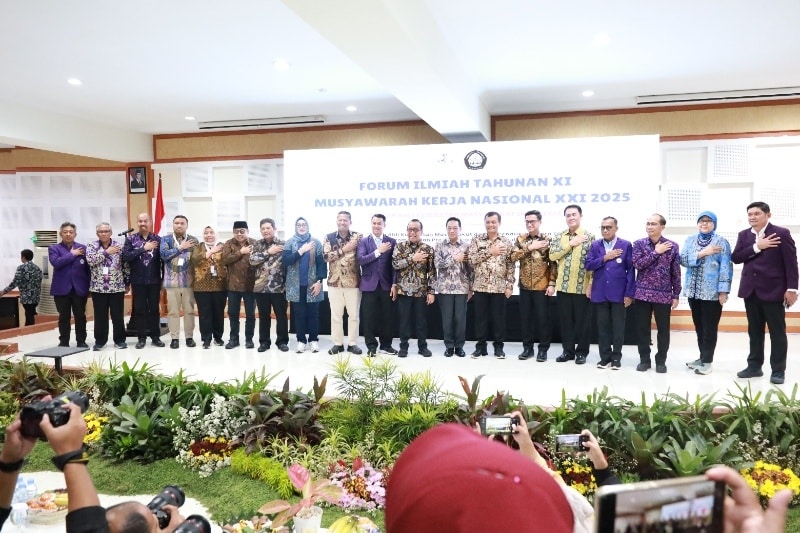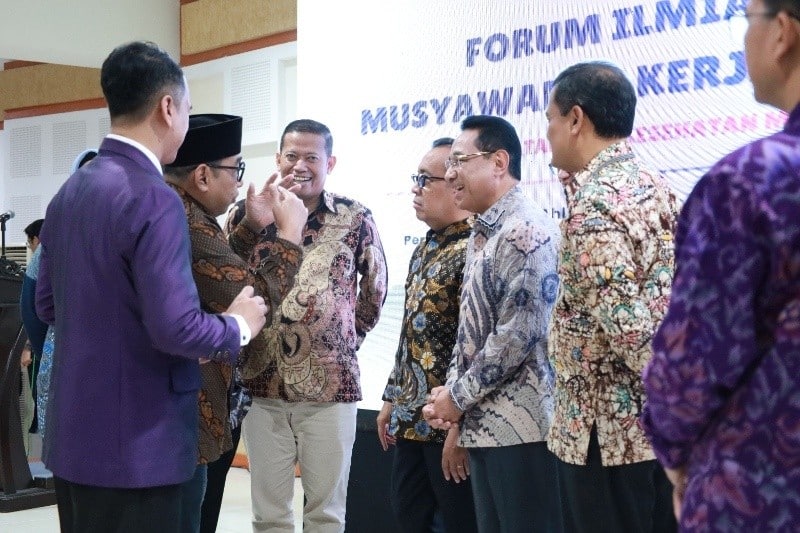UNDIP, Semarang (November 1, 2025) – The Indonesian Public Health Experts Association (Ikatan Ahli Kesehatan Masyarakat Indonesia / IAKMI) held its 11th Annual Scientific Forum (Forum Ilmiah Tahunan XI IAKMI 2025) at the Faculty of Public Health, Universitas Diponegoro (UNDIP), on Friday, October 31, 2025. The forum carried the theme “The Role of Public Health Experts in Supporting Asta Cita: Strengthening Sustainable Promotive and Preventive Strategies Toward a Golden Indonesia.”
This event served as a collaborative platform for stakeholders to strengthen the role of public health experts in supporting Asta Cita—Indonesia’s eight key national development agendas—by advancing sustainable, promotive, and preventive strategies toward the vision of Golden Indonesia 2045.
The Indonesian Coordinating Minister for Human Development and Cultural Affairs officially opened the annual forum. Prof. Dr. Pratikno, M.Soc.Sc., emphasized two key areas: food security and health. He stated that Indonesia is currently preparing itself to achieve Golden Indonesia 2045, targeting the realization of a developed nation with a healthy, productive, and highly competitive society. “To achieve that goal, the government has set eight national development agendas (Asta Cita), one of which is improving the quality of human resources,” said Prof. Pratikno.
The Chairman of the Association of Indonesian Public Health Higher Education Institutions (AIPTKMI), Prof. Asnawi Abdullah, Ph.D., who also serves as the Head of the Health Development Policy Agency (BKPK) of the Ministry of Health, explained that the 21st IAKMI National Working Meeting (Mukernas XXI) and the 11th Annual Scientific Forum were attended by 500 participants from across Indonesia. “This forum is a highly relevant and strategic platform, as IAKMI bears a significant responsibility in preparing excellent human resources to support sustainable national development,” he said.

He further noted that strengthening a health system focused on promotive and preventive approaches is essential to support sustainable development. Such approaches are viewed as more effective and efficient in addressing increasingly complex health challenges, including the rise of infectious diseases, healthcare access disparities, and the impacts of environmental change and lifestyle shifts.
Therefore, he emphasized the need for high-quality human resources in the field of public health. He proposed two initiatives to advance the public health profession: the establishment of a public health professional education program and a functional career track for public health professionals.
The Governor of Jawa Tengah, Komjen Pol (Purn) Drs. Ahmad Luthfi, S.H., S.St.M.K., also expressed his support for the Coordinating Ministry’s focus on food security and health by implementing programs such as Mobile Specialist Doctors (SPELING) and poverty reduction initiatives across Jawa Tengah.
Meanwhile, Chairman of the IAKMI Executive Board, Dedi Supratman, SKM., MKM., stated that strengthening public health outcomes requires the active contribution of experts, graduates, and students in the field of public health.
UNDIP Rector, Prof. Dr. Suharnomo, S.E., M.Si., expressed his appreciation for the successful organization of this annual forum. He reiterated UNDIP’s commitment to supporting government programs through impact-driven research and innovation that directly benefits communities. One such innovation is UNDIP’s desalination machine, which can process seawater, brackish water, or polluted water into clean drinking water.
The Rector shared that seven desalination units have already been deployed across several regions, including Brebes, Demak, and Blora, and that UNDIP aims to produce 30 additional units for distribution along the northern coastal region (Pantura). He also expressed gratitude to the Governor of Jawa Tengah for his responsiveness to local challenges. Together with the Semarang City Government, UNDIP actively supports government programs that address stunting, as well as maternal and child health.
In addition, UNDIP collaborates with the National Disaster Management Agency (BNPB) through the development of five mobile desalination units—another UNDIP innovation—to be used in disaster-affected areas. These initiatives reinforce UNDIP’s identity as a university that is noble and valuable to society.
Through the 21st IAKMI National Working Meeting and the 11th Annual Scientific Forum, scientific recommendations and strategic policy directions will emerge to cultivate excellent human resources capable of realizing a healthier, more resilient, and globally competitive Indonesian society. (Public Communication/UNDIP/Utami)










